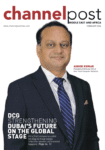Haifa Ketiti, Senior Systems Engineer, Middle East, Proofpoint, talks with Channel Post MEA about how her personality and the attitude to challenge herself that is reflected in her career.

Tell us about your leadership style and philosophy
I believe my personality traits are reflected in my professional style and philosophy. I’m a self-starter and always concentrated on setting and achieving goals for myself – which I admit I set the bar pretty high for!
With this in mind, I am constantly looking for the most effective solutions to enable me to meet these goals, in both a personal and professional sense. I also think these targets are best met in collaborative, diverse teams, not in a silo.
The fact I am solution-oriented is a transferable skill that I believe fits well with the daily challenges we have in the cybersecurity industry. The fast-moving, constantly evolving day-to-day work that comes hand in hand with the role constantly requires me to adapt to new challenges, with new solutions – and fast!
What made you choose IT as a career opportunity?
I’ve been interested in the IT space for years and it was during my higher education that I truly decided it was the career route for me. I chose telecommunications as a major at university and knew during my studies that I wanted to become a cybersecurity professional.
From a career development point of view, the field is promising and presents a lot of opportunities for growth and an ongoing career – cybercrime isn’t going away anytime soon! The past-faced nature of the industry also makes it exciting and ensures that no two days are the same, which keeps me on my toes.
IT is present in everything we do, every day, for everyone – this makes cybersecurity of utmost importance. Being able to say my day-to-day work helps keep people safe and secure while using their devices is enough to get me up in the morning!
What was your most interesting job?
I would honestly say that my current job at Proofpoint is my most interesting role to date. I get the chance to help people find solutions and use the best technology to achieve their goals, and most importantly keep them and their data safe.
I am very passionate about the industry and the technology I’m currently working with.
What advice would you give to women looking to break into the field of computer technology?
My advice to women who want to pursue a career in IT is to find their voice and confidence and go for it, without being intimidated by any diversity issues that the industry has previously faced.
Focus on your target and continue to work on enhancing your skills, building your self-confidence, and pursuing your goals. Women can be and very much are cyber professionals.
Constantly build your knowledge and network by attending workshops, technical sessions, networking events and industry shows – network with not only influential women in the industry but men too.
What is the greatest transformation in technology you’ve witnessed in your career?
The importance of cybersecurity has grown throughout the last decade and it’s becoming an ever-critical technology for all businesses and individuals alike.
Over recent years the threat landscape has shifted away from infrastructure attacks aimed at servers, endpoints and networks as the primary focus. Instead, cybercriminals are increasingly targeting people with socially engineered attacks, and these people are often not the employees you would expect. Our recent Voice of the CISO Survey shows that 70% of CISOs in the UAE still consider the human error to be their organization’s biggest cyber vulnerability. CISOs in the UAE listed using unauthorized devices, tools, and applications as well as falling victim to phishing emails as the most likely ways employees put their business at risk.
This shift to targeting people requires a different approach to cybersecurity strategies – one that’s people-centric and encompasses process, technology and people combined.
What are your thoughts on the next transformation in the tech industry?
From a technical point of view, I believe the next transformation is that automation will be everywhere, although it might seem to be scary at certain times, it will allow everyone to save time, increase quality, and reduce costs.
When it comes to transformations for gender diversity in the industry, some countries in the Middle East region are embracing diversity and gender balance strategies as part of their agendas to foster inclusion. UAE is known as a multi-cultural country and has been focused on accelerating diversity in the region through different initiatives. The launch of the Diversity Council MENA echoes the Government’s pledge on highlighting women as powerful and crucial pillars of business and society.
However, diversity goes way beyond gender and for the cybersecurity industry to keep pace with the evolving threat landscape, it needs a greater diversity of all types and at all levels – backgrounds, culture, ethnicity, age, experience, qualifications and beyond.
What’s next for you in terms of your career in the tech industry?
I am lucky to work within an organization that empowers strong female role models – from technical roles, to on the board. Diversity is embraced within all areas of the business. And, I’m currently focused on enhancing my technical skills as I strive for technical excellence but I aim to be able to lead a team and share my knowledge and motivation with others.
It is paramount that organizations start harnessing their powerful female business professionals as ultimately cyber risk is just another business risk. When it comes to the shortage of women in the IT industry, organisations not only need to consider engaging a new, future workforce, but also how they are going to retain their current female leaders that want to progress within the industry.












